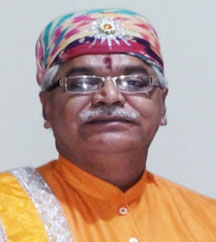
Hindu calendar is a collective name for most of the lunisolar calendars and solar calendars used in India since ancient times. There are several regional Hindu calendars and the month which starts the year also varies from region to region.
Hindus in various states of India celebrate the New Year in their own ways and not all of these fall on the same day. Major states in North and South India (Nav Varsh Samvat or Hindi New Year or Chaitra Shukladi) celebrate their New Year on Vikram Samvat Chaitra Shukal Pratipada (March-April) the first day after the No Moon (Amavasi) in Chaitra Month. The Hindi New Year is based on lunar calendar and therefore the date changes yearly.
Usually, the Andhra Pradesh (Ugadi) , Karnataka (Ugadi), Maharashtra (Gudi Padwa), Kashmir (Navreh), Manipur (Cheiraoba), Himachal Pradesh (Chaitti and Basoa ), Bihar (Chaitra Pratipada), Jharkhand and Uttar Pradesh (Chaitra Pratipada) and Sindhi (Cheti Chand) New Year falls on the same day – the first day of the month of Chaitra Shukla, heralding the advent of Spring. In mid-April, the Bengal (Poila Baishakh), the Assam (Bihu), and Tamil (Puthandu), Punjab, Orissa (Mahavishuva Sankranti), Kerala (Vishu) celebrate the beginning of their new year.
Kutch (Ashad Beej or Dwitiya) observe New Year on the second day of the Shukla Paksha or waxing phase of moon in Ashada month. Gujaratis observe their New Year the day after Diwali (October). The New Year’s Day in these calendars are based on seasons and the agrarian economy of the region. For majority of the Hindus the New Year date falls in the months of March and April. This time, the Vikram Samvatsar Chaitra Mas Shukla Paksha 2071 will start on 31st of March 2014.
Generally, January 1 is also celebrated by Hindus as part of the grand celebrations being held on the occasion around the world because we accept English New Year Calendar as part of our life. As Hindus, we should welcome and embrace all the New Year days celebrated in the Indian Subcontinent and other parts of the world. We should not forget the religious and cultural importance and understand why and how we celebrate, and the benefits we obtain by celebrating the first day of our own New Year whether we are living in India or abroad.
To celebrate the first day of English calendar, Chaitra Shukla Pratipad, or any of your own regional New Year’s Day, here are the steps to follow to make your New Year celebration a meaningful one.
• As a Hindu, before the celebration of New Year, clean, renovate and decorate your home. On the New Year’s Day dress up in new clothes or your best outfit, and perform family prayers and pujan of Lord Ganesh, Vishnu, Shiva and Devi Ma along with your Kula Devata and Kula Devi with Guru poojan. Offer home-made traditional dishes and sweets to the deities. Listen to the effects of different planets and stars of Nava Samvatsar from the priest and read some holy books of your faith
• Follow your cultural rituals associated with New Year celebrations as rituals carry enormous powers, and generate well-being
• Remember your ancestors, respect your living parents, teachers and spiritual gurus and offer them gifts
• Remember the past on the first day of the year – what we have done good or bad in our life. Do confession in front of God and your parents to pardon your mistakes and request them to bless you with new enlightenment
• Do the pledge not to repeat bad things and misbehaviors in the coming year by Mansa, Vachna and Karmana. Make a wish to uphold love, peace and harmony in the family and community
• Do some charities, donations to the needy people and religious organizations which facilitate to inculcate feelings of sacrifice and helping out others
• Think about protecting and nurturing your family, society, religion, culture and nature for the next generation
• Make efforts to suppress your ego, give love and care for humanity
• As an individual and Hindu try to understand your own responsibility towards uplifting of your spiritual life
Due to the influence of modernity our younger generation is losing touch with our religion, culture, values, traditions and rituals. So we have to make an effort to teach and preserve them.
The goal of any religious celebration is to uplift our spiritual life and build our unique identity in the world. It is every one’s responsibility to pass on our rich religion, philosophy, and culture to the next generation otherwise we will become responsible for losing our identity built over the years by our Rishis, Santa Samaj and ancestors.
Pundit Joshi is highly educated Sanskrit scholar, acclaimed astrologer, Priest and administrator at Grays Lake Hindu Temple
Pundit Anil Joshi






